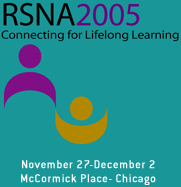
Abstract Archives of the RSNA, 2005
SSG01-03
Development of a Standardized Quality Control Program for Digital Mammography Using Results from the ACRIN DMIST Trial
Scientific Papers
Presented on November 29, 2005
Presented as part of SSG01: ISP: Breast (Digital Mammography)
Martin Joel Yaffe PhD, Presenter: Nothing to Disclose
Aili Kerttu Bloomquist, Abstract Co-Author: Nothing to Disclose
Gordon Edward Mawdsley BS, Abstract Co-Author: Nothing to Disclose
Etta D. Pisano MD, Abstract Co-Author: Nothing to Disclose
Robert Edward Hendrick PhD, Abstract Co-Author: Nothing to Disclose
Laurie Lee Fajardo MD, Abstract Co-Author: Nothing to Disclose
John Michael Boone PhD, Abstract Co-Author: Nothing to Disclose
Kalpana M Kanal PHD, Abstract Co-Author: Nothing to Disclose
Mahadevappa Mahesh MS, PhD, Abstract Co-Author: Nothing to Disclose
Richard Fleischman PHD, Abstract Co-Author: Nothing to Disclose
Joseph Och PHD, Abstract Co-Author: Nothing to Disclose
Mark Bennett Williams PhD, Abstract Co-Author: Nothing to Disclose
Daniel J Beideck MS, Abstract Co-Author: Nothing to Disclose
Andrew D. A. Maidment PhD, Abstract Co-Author: Nothing to Disclose
et al, Abstract Co-Author: Nothing to Disclose
Currently, FDA approved quality control (QC) programs for digital mammography are manufacturer specific. Each system type has different testing procedures and pass-fail requirements. This imposes a large burden and cost to the user. We propose the development of a more unified QC program with use of generic test procedures wherever applicable and additional tests to evaluate device-specific causes for reduction in image quality, dose variation or system failure.
To develop a harmonized QC program, we evaluated the QC data collected during the Digital Mammography Imaging Screening Trial (DMIST). DMIST, conducted under the auspices of the American College of Radiology Imaging Network (ACRIN), is a clinical trial designed to compare the accuracy of digital versus screen-film mammography in a screening population. All sites in the trial followed the same QC program which involved specially-designed tests as well as those specified by the manufacturers. The program was developed to ensure consistency and optimal operation of the equipment during the trial. Testing was more frequent and more extensive than expected for normal clinical equipment. This allowed determination of the usefullness of the tests and the required testing intervals. Failure rates, modes of failure and temporal variation of results for these tests were recorded and analyzed.
Results indicated that after verification of proper operation during acceptance testing, many of the functions tested did not vary beyond acceptable levels. Of 5766 accreditation phantom images, only 57 failed, 37 of which could have been detected by other means. Because of the high reliability of modern x-ray equipment, it was observed that several of the tests performed did not provide useful information and could be eliminated. It was also found that certain aspects of performance such as the display devices required additional monitoring and tests are suggested for this purpose.
A recommended set of tests is presented, which we believe meet the intent and spirit of the MQSA regulations, ensuring that digital mammography systems are functioning correctly, and are consistently producing mammograms of excellent image quality.
M.J.Y.,A.K.B.,G.E.M.: Martin Yaffe's laboratory conducts collaborative research with GE Healthcare and with Fischer Imaging. Martin Yaffe is a member of the Scientific Advisory Board of XCounter.
Yaffe, M,
Bloomquist, A,
Mawdsley, G,
Pisano, E,
Hendrick, R,
Fajardo, L,
Boone, J,
Kanal, K,
Mahesh, M,
Fleischman, R,
Och, J,
Williams, M,
Beideck, D,
Maidment, A,
et al, ,
Development of a Standardized Quality Control Program for Digital Mammography Using Results from the ACRIN DMIST Trial. Radiological Society of North America 2005 Scientific Assembly and Annual Meeting, November 27 - December 2, 2005 ,Chicago IL.
http://archive.rsna.org/2005/4406373.html

